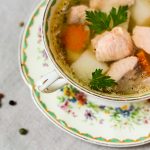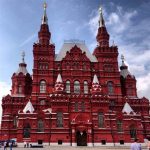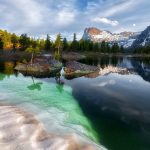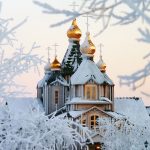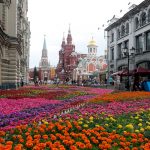We won’t lie: bureaucracy and occasional discomfort and inconvenience, particularly away from the booming urban centres, remain an integral part of the Russian travel experience. However, a small degree of perseverance will be amply rewarded: one of the great joys of travel in Russia is being swept away by the boundless hospitality of the people. Aleksandr Solzhenitsyn and Winston Churchill both wrote famous lines about Russia being an enigmatic riddle. Embrace this conundrum and you, too, are sure to find yourself swept away by a passion for Mother Russia.
Money
Travelers often ask whether it’s necessary to exchange your local currency to Russian Rubles in your home country prior to the trip. Since it’s not always possible to do that, we can reassure you that it’s not a problem to exchange money on the spot. Keep in mind though that rates in airports aren’t usually good, so it makes sense to exchange your cash somewhere in the city (in a local bank or currency exchange office).
First of all, it’s worthy to mention that apart from cash, it’s best to bring your debit card to Russia. ATM machines are very easy to find in Russian cities, so you can easily withdraw Russian Rubles from an ATM machine that usually provides the option to switch the language to English.
Nevertheless, we highly recommend checking your bank’s policies regarding exchange rates and fees (if any) for withdrawing money in another currency in a different country. Also note that if you plan to travel on train or on a ship in Russia, there won’t be any ATMs onboard, therefore you’ll need to think through bringing enough Russian cash with you in advance.
Eating and Drinking
The traditions of modern Russian cuisines are closely connected with the food that peasants cooked already in the Russian Empire. Basic dishes haven’t changed. Certainly, nowadays, when people are in hurry and don’t have enough time to cook at home, they prefer fast food, cafe food, etc. Nevertheless, food and beverages that are served at home are almost the same as they were several hundred years ago.
Russian people are very hospitable, and you can make sure of it when you travel Russia food and beverages are in abundance, especially, during holidays and festivals in Russia.
Usually, there are three main meal times: breakfast, dinner, and supper. Main courses are served at dinner and supper. They include, first of all soups, and it’s impossible to imagine a Russian dinner without them. There are different types of them: “shchi” (cabbages with meat), “rassolnik” (hot soup of pickled cucumbers), “ukha” (boiled fish), “okroshka” (the ingredients aren’t boiled but put in kvas or sour milk; it is usually cooked in summer), “kasha” (porridge) it’s prepared from any grain (buckwheat, rice, wheat).
Most soups are served with “smetana” (sour cream). Though Russia is a huge country, these soups can be easily found almost in any corner and whenever you travel Russia.
Other popular dishes are from meat (sausages, pelmeni, chops, steak), from potato, and there also exist different salads from vegetables and fruits. One should never forget that most food is served with bread that is the most essential thing in Russian cuisine.
In Russia, people drink tea and coffee with pleasure as other nations do; among traditional alcoholic free beverages are prostokvasha, kvas, kompot (stewed fruit); among alcoholic drinks, vodka and samogon lead. Traditional beer in Russia is a bit sour.
Tipping
Tipping in Russia has done a complete 180 over the years. You might not see Russians tip but as a tourist or visitor you are expected to tip.
Taxis: You will likely negotiate the price before your ride. If you don’t then you should round up the fare.
Hotels: You should tip the bellboy about 60 Rubbles per bag. You should also tip the hotel maid about 90 Rubbles per night. This should be left in the ashtray by the bed.
Restaurants: You will be expected to tip 10-15% in cash. If you don’t have a waiter then you don’t have to tip.
Bars: If there is no waiter you won’t be expected to tip. If you do get table service then 10-15% is appropriate.
Other: If you do a tour then you should tip the guide and driver. You should do about 300 Rubbles to the guide and about 200 to the driver.
Australian Government Travel Advice
The Australian Government provides up to date information on the safety of travelling to various countries, and all travellers should take note of this advice. Luminosity recommends that all travellers take out appropriate Travel Insurance to cover the entire duration of their absence from home.
https://www.smartraveller.gov.au/destinations/europe/russia
Follow this link for current official assessment:
Advice on health risks and vaccination recommendations can also be found using the same link.
Weather
In a territorial scale Russia is the largest country in the world with a varied topography, climatic conditions, flora and fauna. On its territory there are diverse plains and mountain vegetation and lots of rivers and lakes.
A distinctive feature of the Russian nature is a variety of climatic conditions with a clear division of the season. With the onset of each season flora and fauna dramatically changes. The country is located in three eight time zones and in three climatic zones. Such location also affects the variety and diversity of nature.
Spring in Central Russia
Spring is the most wonderful season with transformations and changes in everything. This is a time of melting snow, flowing streams and blooming willow. International Women’s Day is celebrated in the first month of spring. Nature returns to life after long winter hibernation: woods put on gorgeous green outfits and fruit trees and shrubs are covered with pleasing to the eye blossoms and spread fragrance.
The middle of spring (between ending of April and beginning of May) is the time for major Christian celebration of Easter. May first is the date of national celebration of Labor Day. May 9 is the most sensitive and touching celebration of all. It is the day of Victory in the Great Patriotic War (WW II). On this day there are meeting with veterans, performances on squares in their honor and other sings of attention are. By this time numerous city flowerbeds are covered with blooming tulips.
Summer in Central Russia
Summer is the one of most pleasant seasons. This is the period of starting school holidays so many families are planning their vacations in nature, in the countryside, at sea or in the mountains. This time of year have pleasant warm weather. One can enjoy magnificent taste of variety of juicy berries through the whole summer. This is the time for ripening of vegetables and other agricultural greenery. Meanwhile wild animals keep growing their offspring which were born in the spring or beginning of summer.
By the end of the summer all leaves lose their bright colors and toke on dark green and brown tints. This is the time when grass turns yellow and ripened wheat, rye and barley crop are harvested. During the harvest forests are full of ripened mushrooms. Summer is the most suitable time for vacations by the sea. Comfortable temperature of water allows full enjoying all the marvels of this time of the year.
Autumn in Central Russia
Autumn is beautiful season. This is the period when trees are covered with their golden outfits. Leaves change their colors to yellow, gold, red and fulvous. The incredible beauty of nature in this season fascinates with its varied and unusual colors. At that time, many birds, who arrived in the spring and raise their young, fly away to warmer climes to spend winter in comfortable conditions. By the end of autumn trees shed their leaves and prepare for the winter. Also people celebrate autumn harvest festival which means that all harvest is gathered and all preparations for the winter coming are finished.
First of September – the first day of autumn marks the beginning of school and is celebrated as the feast of knowledge. And the first Sunday of October is a Professional Teacher’s Day. Period between October and December is a time of many other professional holidays. At this time in the villages there are many weddings.
Winter in Central Russia
Winter is a coldest season of the year. By this time all trees have lost their foliage and only conifers remain green. Snow cover is excellent protection against severe frosts. It envelops trees, fields and houses with charming white covering. Under a white blanket of snow everything looks majestic and graceful.
Thus time of year is known for having a biggest and joyful holiday, celebration of New Year. Its arrival is celebrated at midnight. In Russia one can celebrate New Year for eight times at once. This caused by location of the country in eight time zones. Therefore the celebration is kind of traveling from east to west of Russia during eight hours.
And January 7 is time for Christian Russians to celebrate Christmas, one of the most important religious holidays. This holiday have a national importance and is considered as a day off.
What to pack
In winter: it’s necessary to bring cold weather clothing such as synthetic thermal long underwear, a fleece, a parka, a wind jacket, warm boots. For Sochi and the Black Sea: bring warm clothes, such as a sweater, a jacket, a raincoat or umbrella.
In summer: in Moscow and St. Petersburg, bring spring/autumn clothes, T-shirts and shorts for hot days, but also a jacket and a sweater for the evening and for cooler days; a raincoat or umbrella.
On the Arctic coasts and islands: bring warm clothes, such as a down jacket, a hat, gloves.
In the south, the coast of the Caspian Sea and the Black Sea: bring light clothing, a sweatshirt or a light jacket for the evening.

